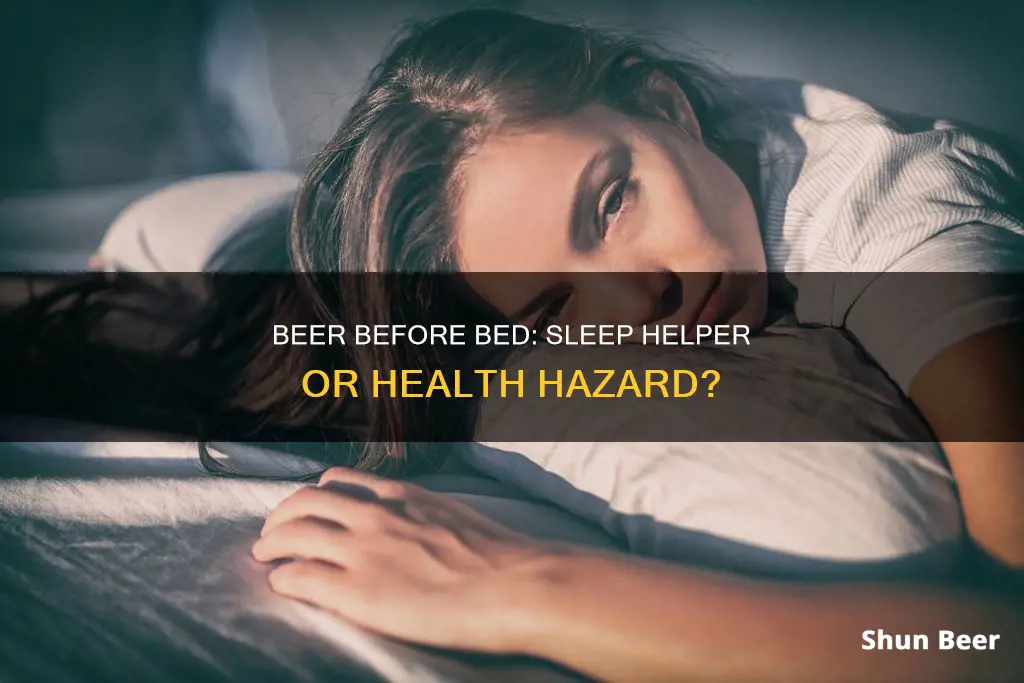
Drinking beer before bed may help you fall asleep faster, but it can also negatively impact your sleep quality. Alcohol is a central nervous system depressant, slowing brain activity and creating a sedative effect. While this may help you relax and fall asleep, it can disrupt your sleep cycle, reducing the restorative REM sleep phase and causing more frequent awakenings. Research shows that even low amounts of alcohol decrease sleep quality, with higher amounts causing more significant disruption. Therefore, it is recommended to allow a minimum of three hours between your last drink and bedtime to ensure you get a good night's rest.
| Characteristics | Values |
|---|---|
| Effect on sleep | Alcohol can help you fall asleep faster, but it negatively impacts overall sleep quality. |
| Sleep disruption | Alcohol disrupts the sleep cycle by reducing REM sleep and increasing slow-wave sleep. |
| Sleep quality | Low, moderate, and heavy alcohol intake decreased sleep quality by 9.3%, 24%, and nearly 40% respectively. |
| Sleep disorders | Alcohol can worsen snoring and sleep apnea, and increase the risk of developing insomnia and other sleep disorders. |
| Circadian rhythm | Alcohol interferes with the body's circadian rhythm, causing frequent waking and affecting sleep-wake cycles. |
| Tolerance | Regular drinking can lead to tolerance, requiring larger amounts of alcohol to achieve the same sedative effect. |
| Dehydration | Alcohol has a diuretic effect, leading to frequent urination and dehydration, further disrupting sleep. |
| Parasomnias | Alcohol increases the likelihood of vivid dreams, nightmares, sleepwalking, and other parasomnias. |
| Safe sleep aid | Alcohol is not a reliable or safe sleep aid due to its varying effects on individuals and potential interactions with medications. |
What You'll Learn

Alcohol is a central nervous system depressant
Alcohol is a potent psychotropic depressant that simultaneously changes several neuronal pathways, profoundly impacting the central nervous system. It directly affects several neurotransmitter receptors, including gamma-aminobutyric acid (GABA), glutamate, and endocannabinoids AEA and 2-AG, among others. It also has an indirect effect on the limbic and opioid systems and impacts calcium and potassium channels and proteins regulated by GABA in the hippocampus. These multiple actions result in a general effect of psychomotor depression, difficulties in information storage and logical reasoning, and motor incoordination.
The sedative effect of alcohol helps individuals relax and makes them drowsy, leading to a faster onset of sleep. However, this effect only lasts for the first part of the night. Once the body starts to metabolise the alcohol, the sedative effects wear off, and alcohol begins to have the opposite effect, disrupting sleep for the rest of the night. It reduces the amount of rapid eye movement (REM) sleep, which is the deepest stage of sleep when dreaming, memory consolidation, and restoration occur. Poor or insufficient REM sleep can lead to grogginess the next day and has been linked to an increased risk of disease and early death.
Additionally, alcohol can interfere with circadian rhythms, causing individuals to wake up frequently or before they are properly rested. It also has a diuretic effect, leading to frequent urination throughout the night, further disrupting sleep. Consuming alcohol before bed can result in overall low-quality sleep and frequent wakings. Even moderate amounts of alcohol consumed before bedtime can reduce sleep quality, and heavy drinking and alcohol dependence are associated with difficulty falling asleep.
Beer and Eliquis: Safe Mix?
You may want to see also

It slows brain activity and creates a sedative effect
Alcohol is a central nervous system depressant, meaning it slows brain activity and creates a sedative effect. This is why drinking alcohol can make you feel relaxed and sleepy. However, while alcohol can help you fall asleep faster, it can also disrupt your sleep later in the night.
As a central nervous system depressant, alcohol slows brain activity. This creates a sedative effect, helping you relax and making you feel drowsy. This is why many people find that alcohol helps them fall asleep more quickly. However, this effect only lasts for the first part of the night. Once the sedative effect wears off, alcohol starts to have the opposite effect, disrupting your sleep.
During sleep, the body typically cycles through four stages: NREM 1, NREM 2, NREM 3 (slow-wave sleep), and REM sleep. Alcohol disrupts this normal sleep cycle pattern. In particular, it can shorten the amount of time spent in REM sleep during the first two sleep cycles and increase the amount of time spent in slow-wave sleep. REM sleep is considered the most mentally restorative phase of sleep, important for dreaming, learning, and memory processing. By reducing the amount of time spent in REM sleep, alcohol decreases sleep quality, leading to more sleep disruptions and fewer hours of sleep overall.
In addition to altering the sleep cycle, alcohol can also disrupt sleep by interfering with circadian rhythms and contributing to sleep disorders such as sleep apnea. As your body metabolizes the alcohol and the sedative effects wear off, it can interfere with your circadian rhythm, causing you to wake up frequently or before you are properly rested. Alcohol also affects people with sleep apnea, a disorder characterised by repeated pauses in breathing during sleep. Alcohol causes throat muscles to relax and increases airway resistance in the nasal passages, thereby increasing the likelihood and duration of breathing interruptions during sleep.
How to Respond When Your Dog Drinks Beer
You may want to see also

It can cause sleep disruptions and affect sleep quality
Alcohol can certainly help you fall asleep faster, but it can also cause sleep disruptions and affect sleep quality.
As a central nervous system depressant, alcohol slows down brain activity, creating a sedative effect. This can help you relax and make you feel drowsy. However, as your body metabolises the alcohol, the normal pattern of four sleep stages can be disrupted.
The typical sleep cycle consists of three non-rapid eye movement (NREM) stages and one rapid eye movement (REM) stage. During the REM stage, your breathing and heart rate increase, and you are more likely to dream. This stage is considered the most restorative part of the sleep cycle and is essential for memory consolidation and learning.
When you consume alcohol before bed, you tend to experience more N3 sleep or "deep sleep" and less REM sleep. Later in the night, once your body has metabolised the alcohol, you may experience more N1 sleep, the lightest stage of sleep, leading to frequent awakenings and fragmented sleep. Research has shown that even low amounts of alcohol can decrease sleep quality by over 9%.
Alcohol can also disrupt your sleep by interfering with your circadian rhythm. As your body metabolises the alcohol, it can cause fluctuations in your sleep-wake cycle, making you feel alert when you want to sleep and sleepy when you want to be awake.
Additionally, alcohol can worsen snoring and sleep apnea, a disorder characterised by repeated pauses in breathing during sleep. Alcohol relaxes the throat muscles and causes changes in the nasal blood vessels, increasing airway resistance and the likelihood of breathing interruptions.
Overall, while alcohol may help you fall asleep initially, it can lead to disrupted sleep patterns and reduced sleep quality throughout the night.
The Last Sip: Beer Drinking Conundrum
You may want to see also

It can lead to sleep disorders like insomnia and sleep apnea
Drinking beer to fall asleep can lead to sleep disorders like insomnia and sleep apnea. While alcohol can make you sleepy due to its sedative effect, it disrupts your sleep later in the night. It reduces the duration of REM sleep, which is the deepest and most restorative stage of sleep. This can lead to grogginess and a higher risk of disease and early death.
Heavy alcohol use is linked to insomnia, a common sleep disorder characterized by difficulty falling and staying asleep. Alcohol reduces both the quality and quantity of sleep, and this effect is more profound as people age. Research shows that heavy drinkers over the age of 50 have a 64% greater risk of insomnia, while less frequent binge drinkers are 35% more likely to develop it. Even small amounts of alcohol can affect sleep quality, with one study showing that fewer than two drinks for men or one drink for women caused a 9% decline in sleep quality.
Drinking alcohol can also worsen snoring and increase the risk of sleep apnea, a sleep disorder characterized by repeated pauses in breathing during sleep. Alcohol relaxes the muscles in the airway, causing obstructions that interrupt natural breathing and waking you up. It increases the time between when you stop breathing and when you "wake up" to breathe again. Alcohol also worsens central sleep apnea, a nervous system disorder, as it slows down the central nervous system and leads to more frequent apnea episodes.
Additionally, drinking before bed can interfere with your circadian rhythm, causing you to wake up frequently or before you're properly rested. It can also lead to more vivid dreams or nightmares and sleepwalking, resulting in restless sleep.
Beer in the Wild West: What Did They Drink?
You may want to see also

It can interfere with circadian rhythms
Drinking beer before bed can interfere with your circadian rhythm, which is a biological pattern that operates on a 24-hour clock. This is because alcohol can decrease the body's sensitivity to cues like daylight and darkness, which trigger shifts in body temperature and the secretion of the sleep hormone melatonin. These fluctuations play a vital role in the sleep-wake cycle, and when they are weakened or absent, a person may feel alert when they want to sleep and sleepy when they want to be awake.
Circadian rhythms are biological patterns that repeat roughly every 24 hours. They are controlled by a biological clock, which is influenced by external cues such as sunlight and time of day. Circadian rhythms affect many aspects of our physiology, including sleep-wake cycles, body temperature, and hormone secretion. When these rhythms are disrupted, it can have negative consequences for our health and well-being.
Alcohol use and dependence appear to interfere with circadian rhythms. Evidence suggests that consuming alcohol may decrease the body's sensitivity to external cues that trigger shifts in body temperature and hormone secretion. These fluctuations are important for regulating the sleep-wake cycle, and when they are disrupted, it can lead to feelings of alertness at night and sleepiness during the day.
The impact of alcohol on circadian rhythms can also be seen in the disruption of sleep patterns. Alcohol can shorten the amount of time spent in REM sleep during the first half of the night, leading to an imbalance in the sleep cycle. This reduction in REM sleep can have negative consequences for cognitive function, including memory and concentration.
Furthermore, drinking beer before bed can lead to frequent urination throughout the night, which can further disrupt sleep and circadian rhythms. The diuretic effect of alcohol causes the body to release more water through urine, resulting in multiple trips to the bathroom and a disrupted night's sleep.
Drinking Beer in Public: What's Legal in Illinois?
You may want to see also
Frequently asked questions
Drinking beer or any alcoholic drink before bed may help you fall asleep faster, but it will not help you get a good night's rest. Alcohol disrupts your sleep cycle by reducing REM sleep, which is the deepest and most restorative stage of sleep.
Alcohol is a central nervous system depressant, which means it slows brain activity and has a sedative effect. This creates a conflict in your brain between alpha activity, which indicates wakefulness, and delta activity, which is slow-wave sleep. Experiencing these two brain activities at the same time inhibits quality rest.
Even low amounts of alcohol before bed can hurt sleep quality. It is recommended that you allow a minimum of three hours between your last drink and bedtime.
Drinking beer before bed can lead to frequent wakings, night sweats, more intense snoring, and nightmares. It can also cause or worsen sleep disorders such as sleep apnea and insomnia.
Yes, there are other ways to improve your sleep besides drinking alcohol. These include drinking water along with alcohol to help flush it out, drinking alcohol with a meal, and avoiding caffeine and carbonated drinks. If you are still having trouble sleeping, consult a healthcare provider or sleep specialist.







